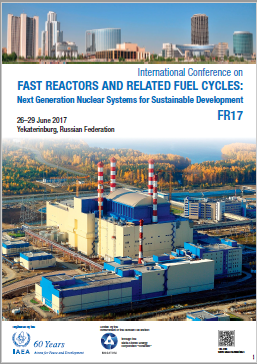Speaker
Dr
Victor BLANC
(CEA)
Description
In the framework of the Basic Design of the Advanced Sodium Technological Reactor for Industrial Demonstration (ASTRID) project, the design margins have to be defined with accuracy. The design criterion considered here is the fuel melting margin during nominal operation conditions, which is given by the melting probability.
Oxide fuel temperature and melting temperature being calculated with the CEA fuel performance code, GERMINAL, results could be depend on parameters from manufacturing processes, irradiation conditions and fuel behavior laws. The aim of this paper is to take into account uncertainties associated to these parameters in the melting margin evaluation and to quantify the sensitivity to these parameters.
In a first approach, GERMINAL calculations of the temperature distribution given by analytic method is compared with direct Monte-Carlo sampling and with a reliability dedicated method by using the CEA uncertainty and sensitivity simulation platform, URANIE. First sensitivity analysis shows that linear heat rate, fuel stoichiometry and fuel clad gap are the first order parameters.
Afterwards, in a detailed approach, pellet geometrical defects in fuel pellets are taken into account using a 3D finite element model based on CEA LICOS code. The maximum temperature being considerably dependent of these defects, a simple meta-model is built, and is linked with GERMINAL in order to build an artificial neural network. Using this global meta-model, first and second order reliability methods are finally compared with a large number of direct Monte-Carlo simulations in order to determine the fuel melting probability.
Country/Int. Organization
French Alternative Energies and Atomic Energy Commission, DEN/CAD/DEC/SESC/LC2I
Primary author
Dr
Victor BLANC
(CEA)
Co-authors
Dr
Antoine Bouloré
(CEA)
Mr
Edouard Thebaud
(CEA)
Dr
François Charollais
(CEA)
Dr
Jean-Christophe Dumas
(CEA)
Mr
Marc LAINET
(French Alternative Energies and Atomic Energy Commission (CEA))
Dr
Michel Pelletier
(CEA)
Mr
Thierry BECK
(CEA)
Dr
Thierry Lambert
(CEA)
Mr
Vincent Dupont
(CEA)
Dr
bruno michel
(CEA/DEN/DEC/SESC/LSC)

